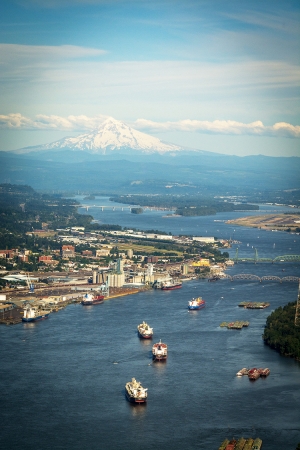


(Posted on 12/04/22)
In collaboration with US Customs and Border Protection (CBP) and the Foreign Trade Zone Board, the Port of Vancouver USA has activated Foreign Trade Zone (FTZ) #296. The Port of Vancouver USA is primarily a bulk import and export facility with dedicated facilities for specific commodities, such as grain, soy beans, corn, mineral ores, concentrates, fertilizers, clays, bauxite and agricultural commodities.
One of the port’s wind energy customers will be the first to utilize the newly activated FTZ.
Foreign Trade Zones (FTZs) are important economic development tools that the port can utilize to help local companies and surrounding communities grow. FTZs offer a temporary duty-free zone to customers who are importing or manufacturing products from globally sourced materials. A duty is a tax levied by governments on the value of imported products. Often individual materials will have a higher duty rate than a finished product. The advantage of an FTZ is that it allows manufacturers to pay duty on the finished product rather than on the individual components, providing significant savings.
Foreign Trade Zones have many public benefits:
Help facilitate and expedite international trade.
Provide special customs procedures as a public service to help firms conduct international
trade related operations in competition with foreign plants.
Encourage and facilitate exports.
Help attract offshore activity and encourage retention of domestic activity.
Assist state/local economic development efforts.
Help create employment opportunities.
The Port of Vancouver first began the detailed and lengthy process to become a Grantee of a Foreign Trade Zone in 2010. FTZ #296 was established in 2016 for the port and covers all of Clark County. Facilities outside port property, but within Clark County, can be activated as subzones for a specific company to use to take advantage of FTZ benefits. For example, if a bicycle manufacturer imports parts but assembles the bicycles in a factory within Clark County, their facility could be activated as a subzone so that the duty paid would be assessed on the finished bicycle and not on the individual components. All FTZs in Clark County are managed through the Port of Vancouver. Though the port is always looking for partners who can benefit from this FTZ, it has remained inactive since its establishment until now.
“As trade evolves, we continue to offer resources to help our customers keep their cargo moving. The activation of FTZ #296 offers another valuable tool for us to utilize so we can help further economic development within Southwest Washington,” said Jim Hagar, Economic Development Project Manager for the Port of Vancouver USA.
Euroports has announced the renewal of the concession for Terminal Rinfuse Venezia (TRV) at Porto Marghera... Read more
Contributing to the commitment of achieving net zero emissions by 2050, the Panama Canal authority has... Read more
The Saguenay Port Authority in Quebec has ordered a Konecranes Gottwald ESP.6B Mobile Harbor Crane for... Read more
North Sea Port Supervisory Body has appointed Cas König as the port authority's new CEO. Kö... Read more
After 19 years at the helm of the Port of Trois-Rivières and a career rich in major projects,... Read more
Abu Dhabi based AD Ports Group, an enabler of integrated trade, transport and logistics solutions, has... Read more
The Port of Rotterdam and Port of Antwerp-Bruges have welcomed the Clean Industrial Deal, through which... Read more
The Canadian Port of Trois-Rivières is delighted to have received major funding of $87.1 million... Read more
Belgian logistics giant Katoen Natie has ordered four all-electric Konecranes Gottwald Mobile Harbor... Read more
AD Ports Group, Abu Dhabi based enabler of integrated trade, transport and logistics solutions, has... Read more